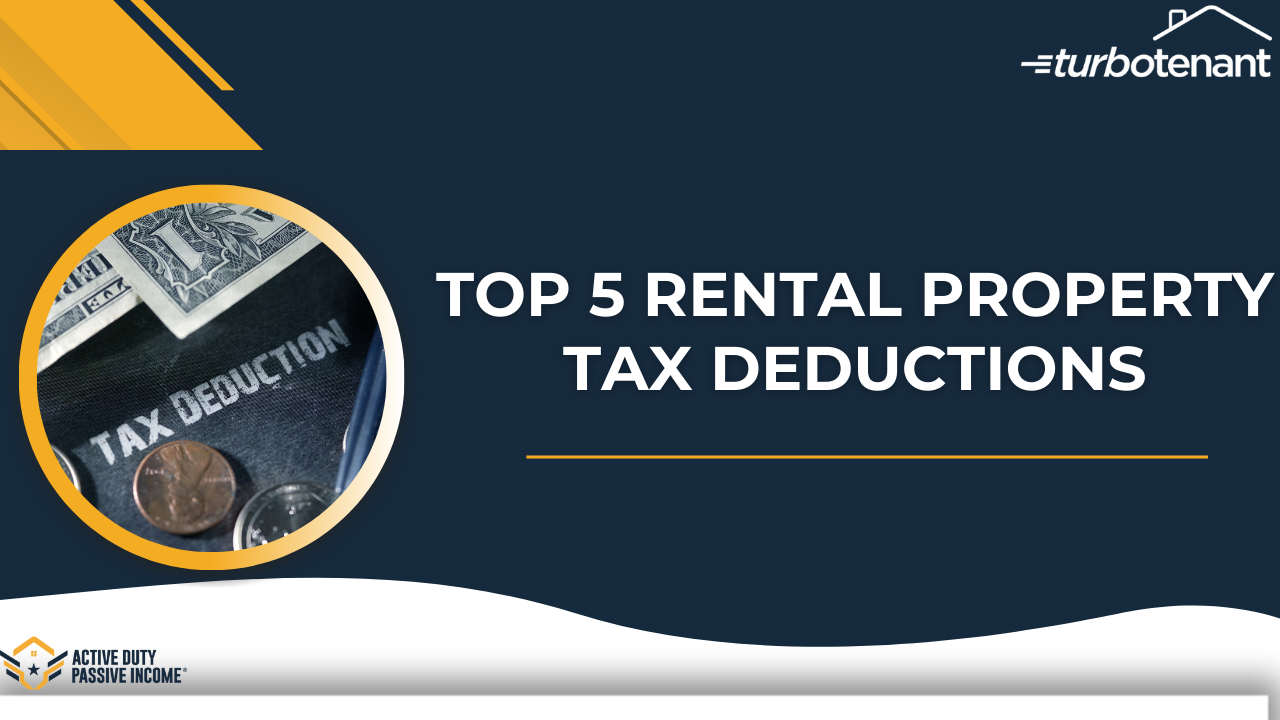Leveraging VA loan benefits to invest in real estate is a great way to build wealth as an active service member or veteran. Rental properties generate a healthy monthly income stream and appreciate over time, contributing to your net worth in more ways than one.
Anyone who owns rentals knows there’s always a good deal of recurring or surprise costs that eat at your profits. The good news? Most of those costs can be deducted on your taxes, protecting your bottom line and increasing your investment profits.
As an investor, you should be applying rental property tax deductions every year to legally reduce your taxable income. Rental accounting can be tricky, so we developed this guide for the top five tax deductions every military landlord should take advantage of, plus some tips to get you through this tax season.
1. Mortgage Interest
Mortgage payments can be hefty – especially in a high interest rate market. Luckily, the interest you pay on your mortgage is 100% tax deductible. This applies whether you’re using a VA loan, private loan, or other financing method.
Using your VA loan to house hack? You can still deduct your mortgage interest for the portion of the property that is rented out to a tenant.
2. Depreciation
Rental properties are meant to be a home for tenants, which can mean a good deal of regular wear and tear on your property. That’s the beauty of the rental property depreciation tax law: while you provide a home to tenants, you can also deduct standard wear and tear to help offset the costs of owning rental property.
The IRS allows rental property owners to depreciate the value of their property over 27.5 years. This means you can deduct a portion of your property’s value each year, reducing your taxable income without affecting your cash flow. Keep in mind that land value is not depreciable—only the structure itself.
For more information, you can check out this guide to maximizing your returns on rental property depreciation.
3. Property Taxes
As a landlord, you can fully deduct property taxes on your rental property. Given that property taxes vary widely by location, this can be a significant deduction. For military investors who own properties in different states, staying informed about local property tax rates can help with long-term planning.
4. Repairs and Maintenance
Savvy investors know that rental properties require regular upkeep and maintenance. It’s part of making sure your property is suitable for tenants (and encouraging great tenants to renew) while also remaining competitive in a volatile market.
Rental property routine maintenance costs are fully deductible. Examples include leaky roofs, mold removal, HVAC repair, and even fresh paint. As long as the repair occurred in the correct tax year, you can leverage this tax benefit.
Keep in mind that improvements that increase the property’s value, like adding a new room or a pool, must be depreciated over time rather than deducted immediately. Rental accounting software can help you correctly catalog these updates.
5. Professional Services and Property Management Fees
If you use a property manager, property management software, attorney, accountant, assistant, or other real estate professional to help you manage your rental business, these costs are deductible. When you’re active duty military, you might rely on property management software or an assistant to help manage your properties while you’re stationed elsewhere. Don’t forget to deduct this crucial expense from your taxes.
Rental Property Tax Season Best Practices
Tax season can feel overwhelming and complex as a rental property owner. However, by leveraging software, dedicating a little bit of time to tax season prep, and possibly consulting a professional, you’ll be able to sail through tax season while maximizing your returns. Here are some best practices to keep in mind:
- Keep Detailed Records: This is the number one most important tip to avoiding any tax season nightmares. Make sure you’re keeping record of all rental property income and expenses. You can easily simplify and automate this process with software created for rental accounting.
- Separate Business & Personal Finances: It’s recommended to use a separate bank account for your rental property income and expenses so you can easily identify which items are personal or business related.
- Stay on Top of Receipts: Scan and keep all receipts for repairs, maintenance, and other rental professional services. If you’re using rental accounting software, you can automate booking for these expenses online.
- Work with a Tax Professional: If you’re feeling like you’re missing something, it’s always a good option to hire a CPA who specializes in real estate to help you navigate deductions and tax laws. Some rental property accounting software solutions also have customer support dedicated to answering FAQs around rental property taxes.
- Plan for Estimated Taxes: If you have significant rental income, consider making quarterly estimated tax payments to avoid penalties.
Pro Tip: Using rental accounting software is the easiest way to automate year-round bookkeeping and stay ahead of tax season. Accounting software will help you automatically book recurring expenses, prepare your Schedule E, and provide information on tax deductions you should be leveraging based on your specific portfolio.
We recommend TurboTenant.
Get TurboTenant Accounting
Final Thoughts
Although complicated, tax season can be a huge asset for real estate investors looking to keep more of their profits. While we covered some of the most popular deductions, we recommend using a real estate-specific accounting software or a CPA to help you further identify all your applicable deductions, especially as a military member.
Looking for an affordable and simple way to keep your books and prepare for tax season? TurboTenant’s accounting software is built to make this process easier.







